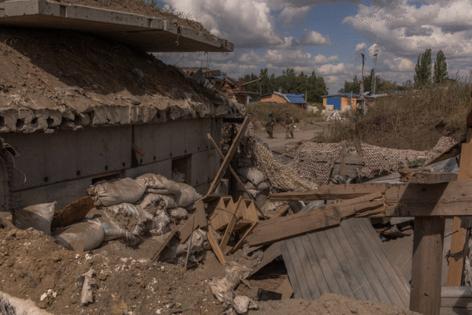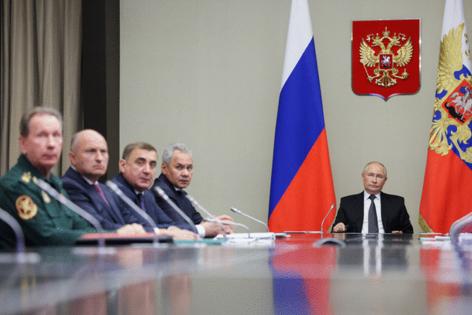Kremlin is treating Ukraine's incursion like a natural disaster
Published in News & Features
With a foreign army fighting on Russian soil for the first time in 80 years, President Vladimir Putin gathered top officials Friday at his regular security council meeting for a report by Defense Minister Andrey Belousov.
The main topic wasn’t Ukraine’s shock seizure of territory in Russia’s Kursk border region. Putin said they’d discuss “new technical solutions adopted during the special military operation,” Russia’s euphemism for its war in Ukraine, in a brief televised excerpt.
The Kremlin’s attempt to convey a sense of normality over the Ukrainian incursion is being replicated in state media. They’ve focused reporting mostly on efforts to bring humanitarian aid to the nearly 200,000 people who’ve fled their homes, as if they’re victims of flooding or some other natural disaster rather than the first foreign military intervention since World War II.
“The Kremlin doesn’t want to send a message that the enemy is at the gate,” said Olga Oliker, Director for Europe & Central Asia at the International Crisis Group in Brussels. “They don’t want to send a message of Ukraine’s strength and their own weakness.”
Ukraine says it’s continuing to expand operations in Kursk and controls dozens of villages and towns with the incursion in its second week. Russia’s Defense Ministry has rushed reinforcements to try to restore control, so far without success. Authorities have also declared a state of emergency in the neighboring Belgorod region, where officials report mounting cross-border attacks from Ukraine.
It’s a stunning reversal for Russia more than 900 days after Putin ordered the February 2022 invasion that was meant to deliver a swift victory. Ukraine’s military strike caught its allies in the U.S. and Europe by surprise, too, where some had long worried that allowing Kyiv to carry the war into Russia would be a red line provoking a harsh response from Putin — maybe even a nuclear one.
The Pentagon said the U.S. was “still trying to learn more” about Ukraine’s objectives after Defense Secretary Lloyd Austin spoke by phone to his Ukrainian counterpart Rustem Umerov on Wednesday.
The Kremlin appears reluctant even to admit an invasion took place, saying Putin discussed “current issues” with top officials on what he called “the situation” on the border at a meeting on Monday.
“It goes without saying that the main objective for the Defense Ministry is to force the adversary to withdraw from our territory,” Putin said, threatening a “strong response.”
Still, tensions bubbled into view at the meeting. Putin abruptly interrupted the acting governor of Kursk region, Alexey Smirnov, when he began to describe the scale of the Ukrainian operations, telling him to concentrate on providing aid to displaced residents and leave military assessments to the army.
Even as state television plays down the crisis, concern is growing among Russians. An Aug. 9-11 survey of 1,500 people in 53 regions by the FOM polling company found 45% considered that their family and friends were in an anxious mood, a jump of 12 percentage points since July and the highest level in nearly a year.
The proportion of Russians who said they’re unhappy with the country’s leadership spiked by 7 percentage points in the past two weeks to 25%, with more than half of FOM’s respondents rating the Kursk incursion as the top news event.
While alarm is growing, apathy remains the dominant public response, according to Mikhail Vinogradov, the head of the St. Petersburg Politics Foundation. “Anxiety dominates, not the desire for revenge,” he said.
Putin wants to keep stress levels to a minimum among Russians, who’re already unhappy about the failure to achieve the president’s goals in Ukraine, according to Sergei Markov, a political consultant close to the Kremlin. “But the authorities have a Plan B and if society demands everything is done to achieve victory then we’ll carry out a mobilization,” he said.
Public reaction will likely remain muted as there’s no great desire within the population to go and fight, according to Denis Volkov, director of the independent Levada Center pollster in Moscow. The proportion favoring peace talks rose to 58% at the end of July, the highest since February 2022, he said.
The Defense Ministry in Moscow said Friday its troops were continuing attempts to repel Ukrainian forces in a statement that claimed to have destroyed hundreds of armored combat vehicles including dozens of tanks since the Aug. 6 incursion began.
While the claims couldn’t be independently verified, they inadvertently presented an image of a major intervention that Russia’s security and defense establishment failed to anticipate and prevent.
Ukraine says it’s taken many Russian troops prisoner in the operation including 102 on Wednesday, the largest single group of Moscow’s soldiers to surrender since the beginning of the war. After months on the back foot in fighting in eastern Ukraine, the assault in Kursk has boosted morale among Kyiv’s forces even as Russia continues to make gains in the Donetsk region.
Ukrainian President Volodymyr Zelenskyy called the incursion into Kursk “a security issue for Ukraine, to free areas near the border from Russian troops.” He has vowed to take “the next important key steps” to hold the initiative, without elaborating.
For the Kremlin, the risk is that the more people flee their homes and the longer Ukrainian troops remain on Russian territory, the weaker Putin may start to look as the guarantor of the nation’s security.
Putin avoids “emotional statements so that he doesn’t have to act radically, especially in circumstances where he’s not sure he has the resources to act tough,” said Vinogradov. “In any crisis, he prefers to take a pause and wait.”
With his region now on the front line of the war, Smirnov, the acting Kursk governor, has changed his portrait photo on his Telegram channel. It shows him dressed in a khaki green shirt.
©2024 Bloomberg L.P. Visit bloomberg.com. Distributed by Tribune Content Agency, LLC.










Comments